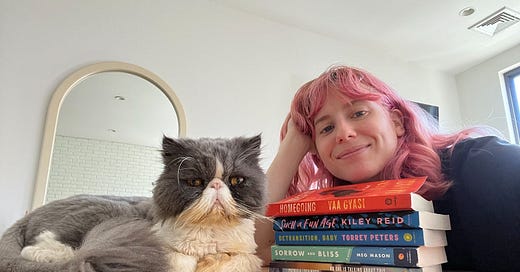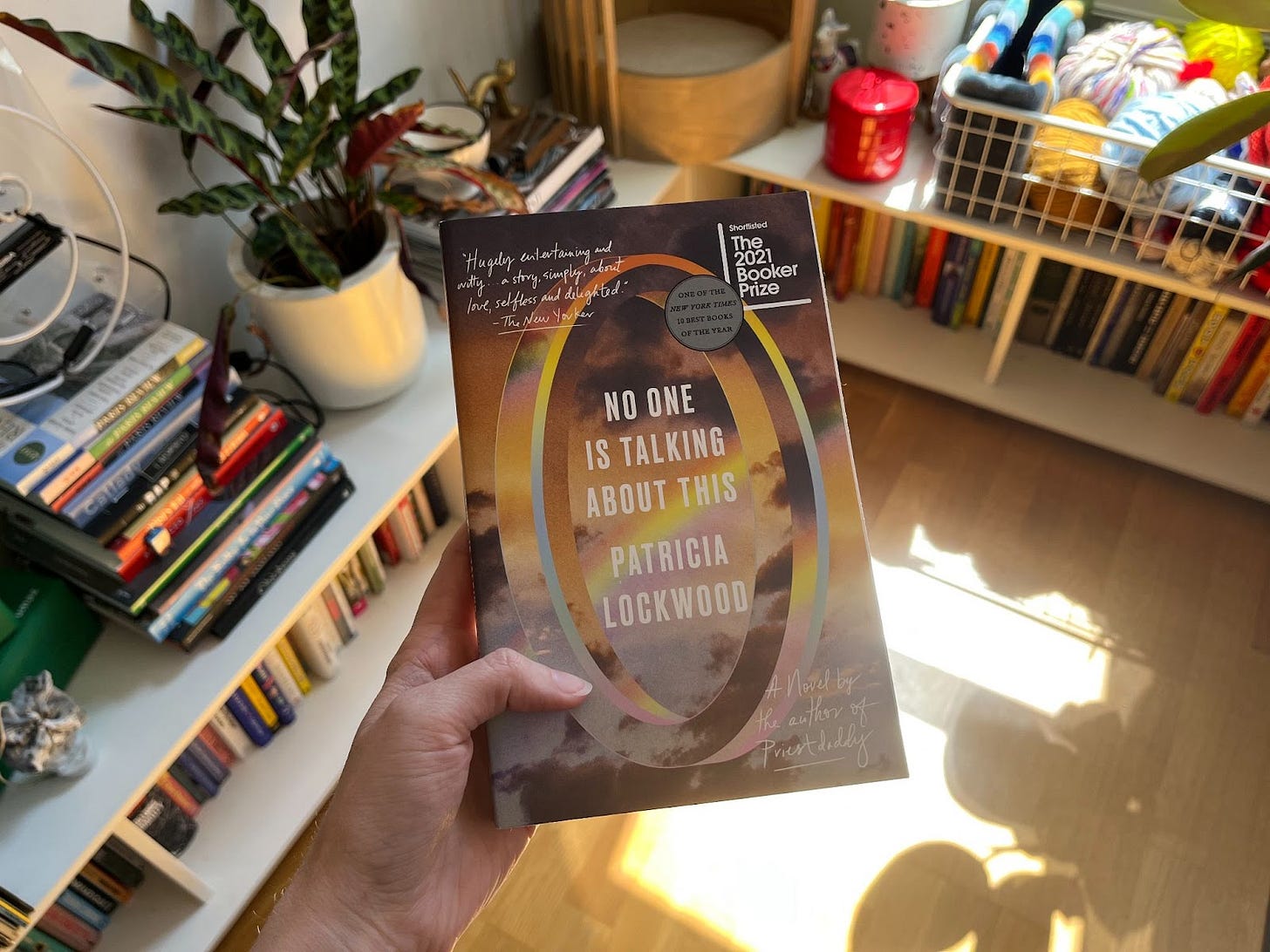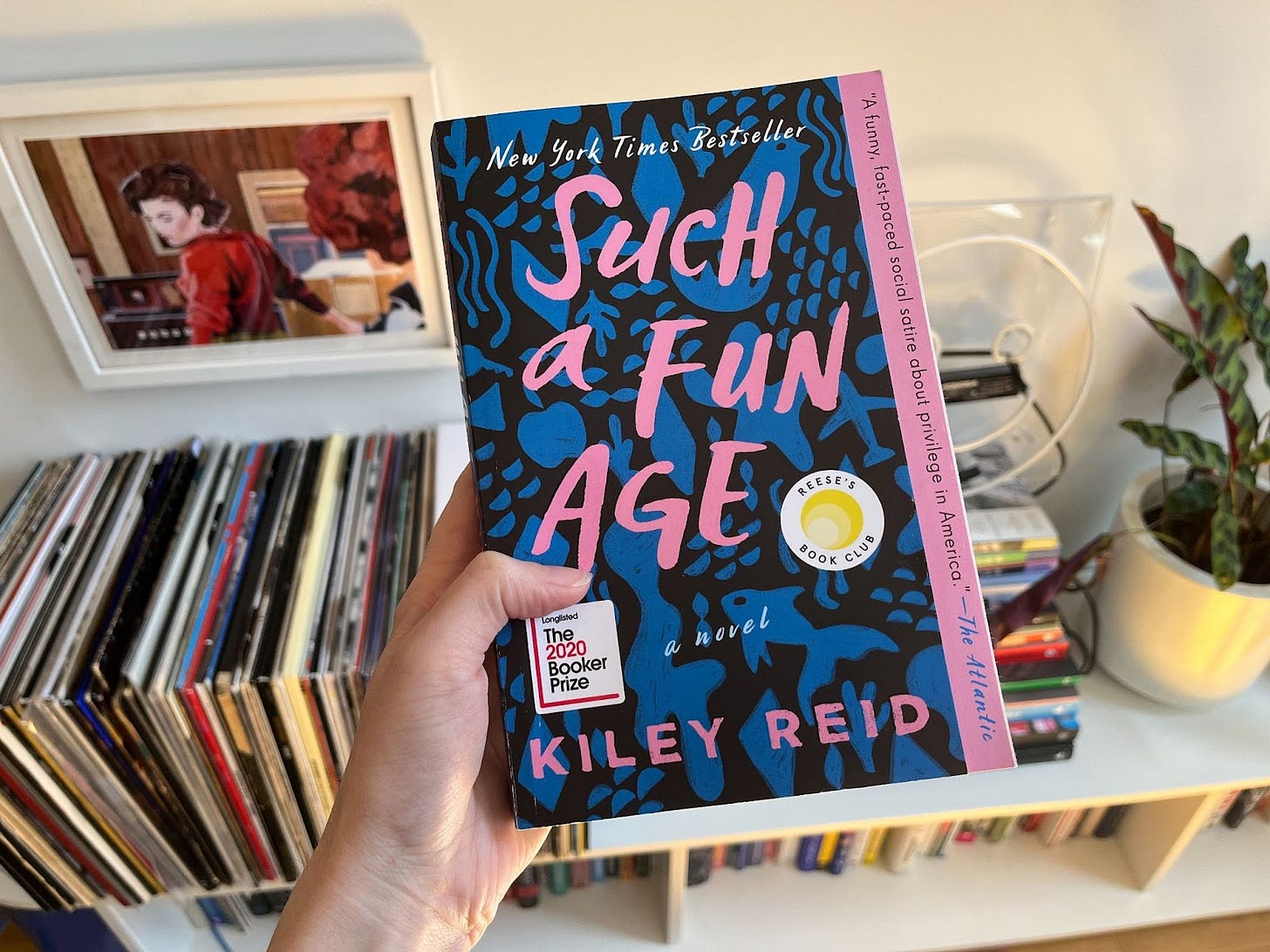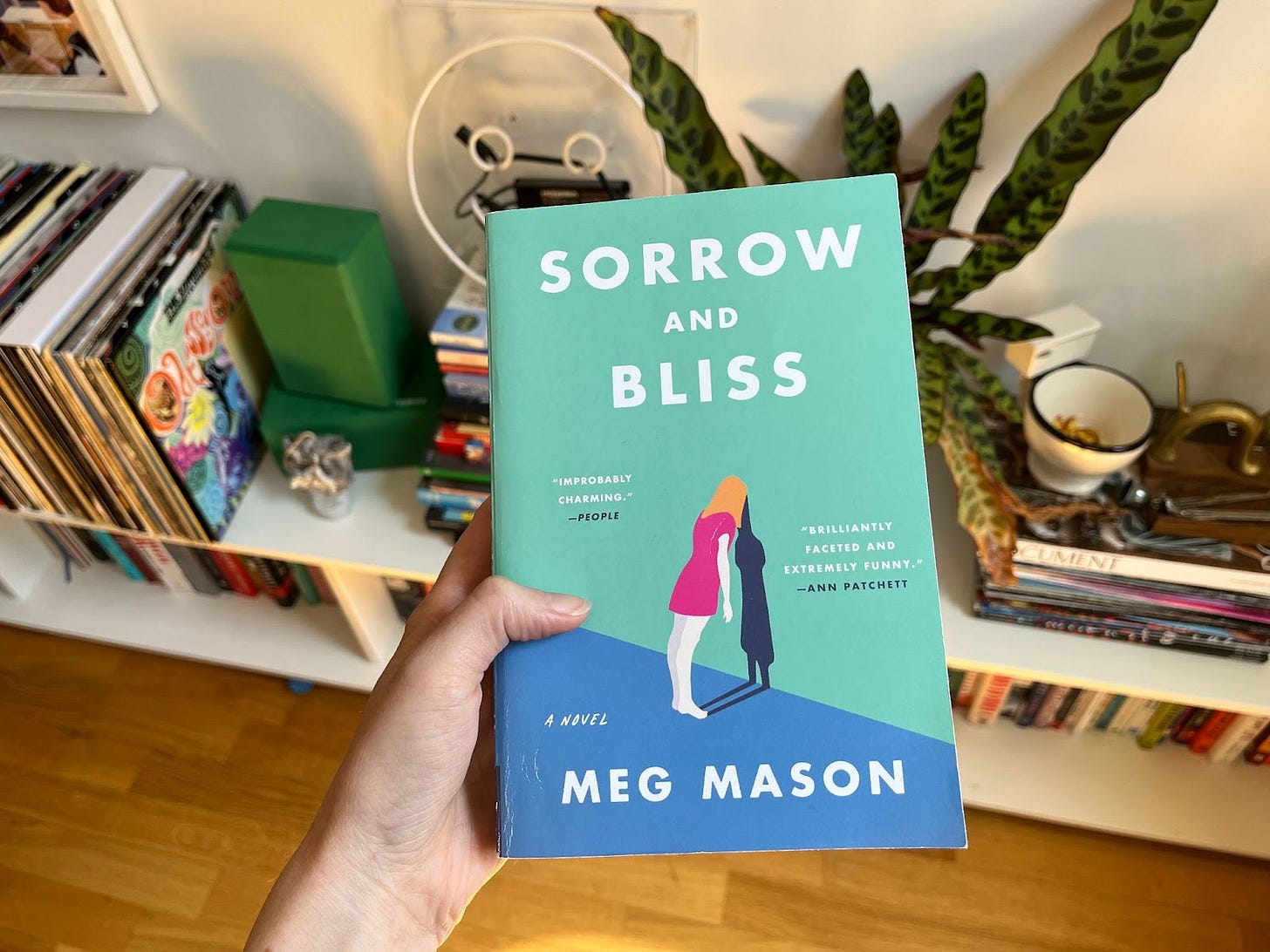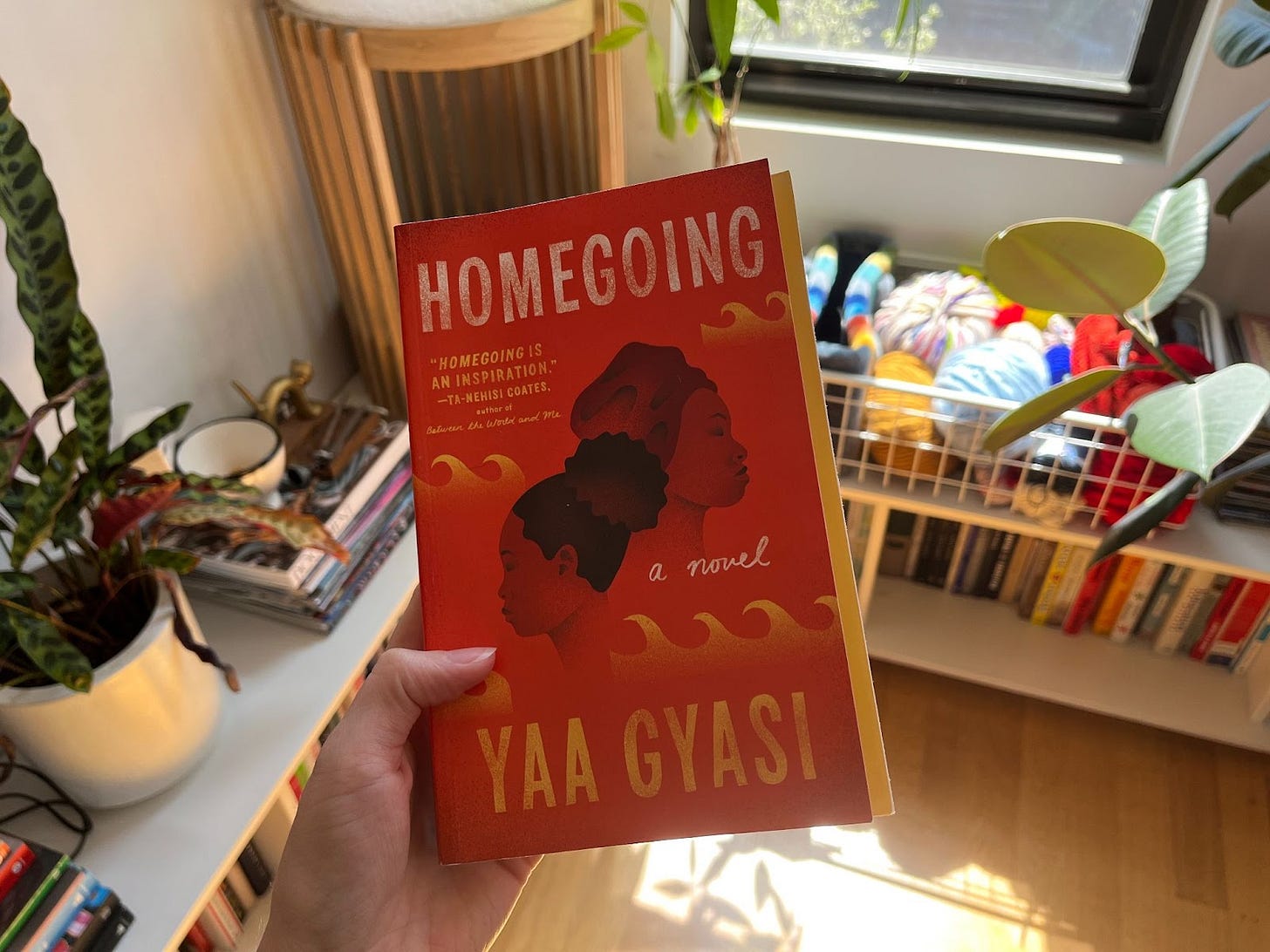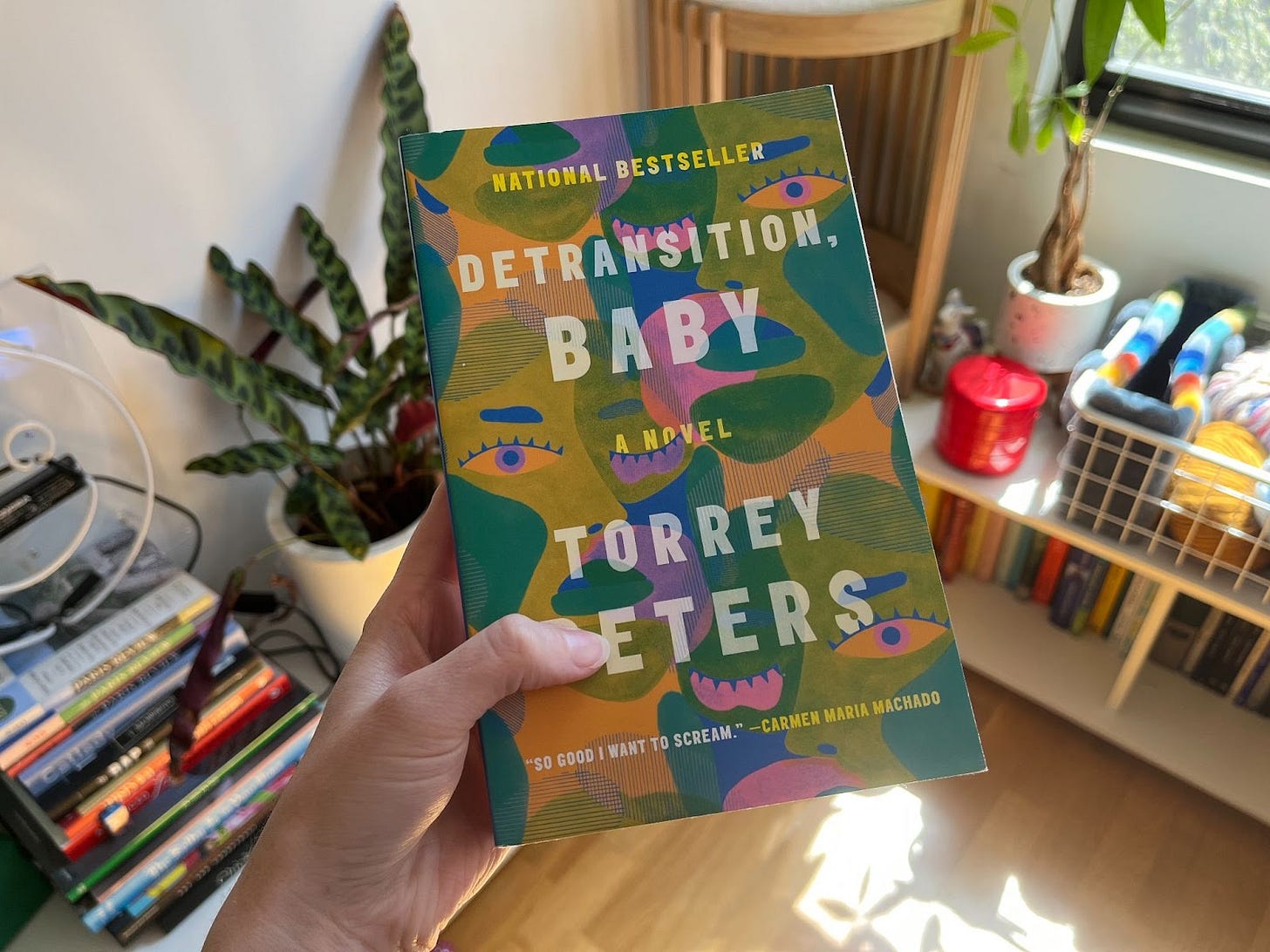#97: 5 books I couldn’t (and didn't) put down
Good morning!
Every week at the end of my Friday roundup, I ask readers for recs on a particular product category (I’ve asked about body soap, cozy blankets that aren’t hideous, prized kitchen utensils, small, high-quality clothing brands, and other newsletters, for example). On March 11th, I asked for literary page-turners—books that are smart and thought-provoking while still being hard to put down, which can be tricky to find. I’d been reading a lot of non-fiction and was in the mood for an immersive novel—something I found often and easily as a kid, and far less so as an adult. (Not least because I’ve gotten pickier and more difficult to convince….) I got hundreds of suggestions, noted down about 30, then walked to a bookstore and bought five. Over the last month, I read all five of them in a fugue state of obsession, which I honestly didn’t expect. I read these books so fast! So I wanted to officially endorse and talk about them here—the contents of my hottest fiction streak in a while. Just in case you’re in the mood to escape your phone, too. Although, I can’t imagine why!
These are non-spoiler reviews, by the way (I would never).
No One Is Talking About This by Patricia Lockwood
Patricia Lockwood is one of the only writers who can actually make me laugh out loud (and I don’t say that lightly—I think a lot of people lie about laughing out loud). I read her memoir Priestdaddy in 2019 and it was the kind of good that puzzled me; I didn’t understand how someone could write like that, so funny and lyrical at the same time. I truly believe Lockwood is singularly talented, a brilliant freak who was born to do what she does. No One Is Talking About This is her debut novel. It makes use of the fact that she’s both a poet and extremely online. If those qualities seem in conflict (tonally, emotionally), that’s basically the point of the book, which does an unsettlingly good job of capturing the harsh key shifts between life on- and offline.
Supposedly Lockwood wrote the book on her phone, which makes sense: In the beginning, it feels eerily like being on Twitter. It follows a woman whose life changes after a tweet goes viral (“can a dog be twins”), and then changes again when her family faces an unexpected tragedy. It’s vaguely autofictional. I went into it with no knowledge of the plot and at one point Avi called to the bedroom asking if the sounds I was making were laughs or sobs. Truly it could have been either. This book is a worthy candidate for art tears. It made me consider what the internet’s really doing for us—whether the multitude of emotions it conjures actually reflects the depths of human emotion, or if it’s something far more diminutive and facile.
Worth noting: Lockwood’s writing is occasionally experimental beyond (my) comprehension. No One Is Talking About This doesn’t follow the rules of traditional, linear storytelling.
Such a Fun Age by Kiley Reid
I’ve known about this book for a while but assumed, based on the cover, that it was something completely different than it is. (We need a book-cover renaissance.) There’s something slightly Rooney-esque about Kiley Reid’s writing in that it’s aesthetically straightforward but emotionally complex, and with a little swagger. Broadly, the story follows a black babysitter named Emira who has a complicated relationship with her white boss Alix. Although the book tackles some hot-button issues—Emira has a video-taped run-in with the police—it never feels like an attempt to comment on “the discourse.” Instead it’s a book about flawed people, mired in the details of their own lives, trying and often failing to live up to the ideals they set for themselves. Even the characters fated to fulfill their stereotypes are given a softening level of nuance, which was refreshing to read during a time when people are so often reduced to their simplest forms. I was particularly disturbed by the character of Alix, whose over-thought and self-centered attempts at progressiveness sent a chill of familiarity down my spine—not just because I’ve known people like her, but because I’ve been like her, too, even if I couldn’t see it at the time. Reid lays bare the kind of racism that’s soft-edged and hard to pin down, but still manages to affect everything. Above all it’s expertly paced; at a certain point, I truly couldn’t put it down. I had to know what was going to happen.
Worth noting: The beginning of the book read a little like YA to me, but as the story unfolded my opinion changed.
Sorrow and Bliss by Meg Mason
Sorrow and Bliss follows the story of a mentally unstable writer named Martha during the dissolution of her marriage. I’m glad someone told me to “ignore the cartoony cover,” because the marketing around this book undersells it—it deserves a more serious cover, more reviews, a more artful synopsis on the back, etc. It’s not especially literary in its prose and can even be a little slangy (which I didn’t love), but it’s acerbic and cerebral, a little twisted and full of poignant observations. I liked the dry, evocative way Mason describes human behavior. On the first page: “The woman had accepted a canapé from a waiter and was putting it in her mouth when she noticed us, realizing in the same instant that it could not be managed in one bite.” After I finished, I missed her ability to load simple exchanges with baggage, the way they so often are in real life. More than the plot or broader message of the book, that ability is what left an impression on me. It made me want to take another stab at writing fiction and describe interactions in more detail than I might assume I should. Overall, this book goes down pretty easy. It’s maybe the best candidate here for getting you back into reading fiction if you’ve fallen off a bit.
Worth noting: Mason leaves a key plot point unexplained. It’s a provocative choice, but I wasn’t entirely convinced by it.
Homegoing by Yaa Gyasi
Homegoing is a sweeping, epic novel that spans over 200 years; it’s probably the most ambitious and impressive of this group. I don’t typically think of myself as enjoying books with rotating protagonists—Homegoing focuses on a different character every chapter, like an interconnected anthology—but I was invested and immersed in every single plotline. (I actually felt the same way about Girl, Woman, Other by Bernardine Evaristo, so maybe I’m wrong about my own tastes.) The book starts in the 1760s, with the story of two half-sisters born in different African villages. It follows their respective bloodlines from there. The beginning of the book has a map of the family tree through eight generations, which bloomed in my head as I read. I can’t imagine the research that went into writing this, and yet it never feels weighed down by it, as if Ygasi wrote it from her own memory. The most moving aspect for me was how close she made the past feel. This story makes plain how absurd it is to treat chattel slavery as ancient history. As you might expect, the story is devastating, but it’s also beautiful and gripping. I fell in love with every character. I’m tempted to call the book “important” for the way it weaves history into its narrative, but that feels patronizing and insufficient. I’m in awe of it. Naturally, as I’m now realizing is the case for every book on this list but especially this one, it made me cry.
Worth noting: I read this book really fast, which I’m not sure I’d recommend. It’s an intense read at times.
Detransition, Baby by Torrey Peters
Detransition, Baby is dense with ideas and I wanted to sit with all of them. The story follows two characters, Reese and Amy, who fall in love as trans women and then break up when Amy decides to detransition, becoming Ames. The book’s reception was divided for its focus—detransition being a favorite topic of anti-trans bigots who claim it happens more than it does—but I respected Peters’s willingness to tell a complicated story without trying to teach readers a lesson. It would have been easy for her to moralize the issue to more readily fit a political narrative, but she refuses. Instead, her characters are complicated, righteous as often as they are fraudulent. For me, this is exactly what made the book compelling. It was a good reminder that a humanizing story doesn’t have to valorize the people in it. It just needs to reveal them as three-dimensional, which more convenient political narratives usually fail to do. Most people I know are capable of being smart and dumb at the same time. This book reflects that in a satisfying way.
Worth noting: The book gets sexually graphic at times.
Thank you to the commenters who recommended these! Not a novel, but I’m also almost done with Memories of a Catholic Girlhood by Mary McCarthy and have loved it. Slightly denser prose than any of these recs above, but some of the sharpest memoir-writing I’ve ever read.
Lastly, if you’re new around here and in more of an essay mood today, I recently compiled some of my most popular newsletters here.
Hope you have a nice Sunday!
Haley

